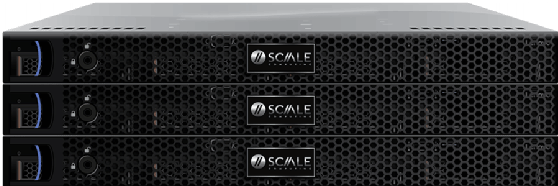
fotomek/stock.adobe.com
Scale HCI systems add NVMe; Pivot3 spins to speed up compute
Scale Computing expands HCI systems with HC3000 line equipped with NVMe flash. Pivot3 Surveillance Series gets power from new Lenovo servers and AMD Epyc CPUs.
Hyper-converged product upgrades by Pivot3 and Scale Computing aim for capacity and performance, but the vendors deploy different types of storage media for their target use cases.
Scale Computing added an NVMe flash hyper-converged infrastructure (HCI) system for enterprise workloads, while Pivot3 rolled out a hard disk drive system for video surveillance this week.
Scale Computing has expanded its HC3 product line with HC3000 appliances equipped with NVMe flash for dense storage in a 1U rack. The inaugural HC3250DF base model takes 10 1.92 TB NVMe M.2 SSDs and is upgradeable to 768 TB of raw NVMe capacity per node for larger enterprise workloads.
The new Pivot3 Surveillance Series appliances, as with its existing HCI systems, capture video streams on hard disk drives with an SSD cache. Surveillance Series appliances get compute power from next-generation Lenovo ThinkSystem SR655 servers with embedded AMD Epyc microprocessors, which are gaining attention as an alternative to Intel chips.
HCI systems bundle compute and storage capacity with connected networking in a single appliance. Data services are orchestrated through an embedded hypervisor.
Interest in virtual desktop infrastructure, one of the earliest use cases for HCI, has spiked as companies equip locked-down employees to remain productive during the global pandemic.

Scale: NVMe flash prices spur HCI growth
Scale Computing and Pivot3 started out with targeted HCI deployments. Scale has traditionally sold to small businesses, but its NVMe-based HC3000 can run high-performance databases, as well as VDI as it pushes into the lower end of enterprise data centers.
"We did early testing with NVMe and HyperCore to prove out the performance.," said Craig Theriac, a Scale Computing director of product management. "We were waiting for the price of NVMe SSDs to drop within the range of SATA SSDs."
HCI systems typically require a minimum of three nodes for failover. Scale Computing allows users to start with a single node and add individual nodes as needed.
HC3000 enhanced the HyperCore OS to enable storage-only mode. Data centers can scale storage without increasing their compute licensing. Networking connectivity includes 25 GbE with Intel Cascade Lake CPUs, plus a 26-core processor option.
The Scale HyperCore operating system does not support VMware vSphere. HC3 nodes run a Scale-developed Linux KVM-based hypervisor.
Pivot3 amps up processing for video crush
Pivot3 began as a video surveillance storage vendor, and still has a big installed base in that market.
Pivot3 vice president Bruce Milne said the new Surveillance Series targets organizations that need to capture and analyze reams of data from IoT and streaming video.
Pivot3 claims the Lenovo-Epyc configuration provides greater storage capacity at a lower cost per terabyte than Intel-based machines. The combination allows a single-socket server to deliver the density and performance of a dual-socket machine, Milne said.
As with Scale's HC3000, Pivot3 Surveillance nodes can be programmed to run as only storage or only compute. "We think it's going to be our workhorse platform for emerging video analytics," Milne said.
HCI vendors have been embracing AMD's second-generation "Rome" Epyc processors, which scale to 64 cores with 128 threads per socket. Hewlett Packard Enterprise, Dell EMC, Lenovo and Supermicro servers support Epyc as an alternative to Intel servers. HPE added ProLiant servers with Epyc processors for its SimpliVity HCI platform earlier this month, and Nutanix also sells Epyc-based HCI products on ProLiant servers.







